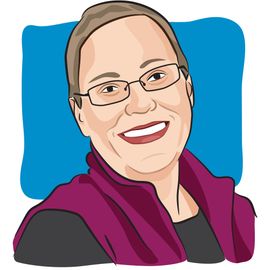- About Us
- Advertise / Support
- Editorial Board
- Contact Us
- CancerNetwork.com
- TargetedOnc.com
- OncLive.com
- OncNursingNews.com
- Terms & Conditions
- Privacy
- Do Not Sell My Information
- Washington My Health My Data
© 2025 MJH Life Sciences™ and CURE - Oncology & Cancer News for Patients & Caregivers. All rights reserved.
The 6 Words My Oncologist Said That Gave Me Hope

Martha lives in Illinois and was diagnosed with metastatic breast cancer in January 2015. She has a husband and three children, ranging in age from 12 to 18, a dog and a lizard.
When I was diagnosed with stage 4 cancer, I was comforted by a simple phrase my oncologist told my husband.
“This is not the same thing.”
My oncologist, the person who I still trust to guide my treatment amid year eight living with metastatic breast cancer, said those words to my husband as we sat in her office right after learning my cancer had spread beyond the breast and was stage 4.
I don’t remember repeating that phrase to him after the appointment, but it was what my heart grasped onto. Like a lot of people with cancer, I was worried about my own life and what cancer was about to do to it, but I was just as worried about what it could mean to the people I love.
My husband had lost numerous friends and family to cancer, including his mom, who died shortly after our middle child was born. How would he be able to move along with me, adjust and adapt and find strength and hope when the backdrop to this new part of our life was so much pain and death?
I was sad for him and sad that I was bringing cancer right into our home. I was worried for him, and I was worried for us.
“This is not the same thing.”
There have been times in my care that I’ve thought about what it would be like to have a different oncologist, one who gives me a hug at appointments or who knows every detail of my personal life. I think it would be nice to have that and there have been times when I’m envious of friends who do.
But I also know my oncologist picks up on worries and concerns with just the slightest piece of information, and she understands the big picture: I want to stay alive, and I want to stay as healthy and happy as possible despite my cancer diagnosis.
“This is not the same thing.”
When she said those words, looking directly at my husband, we had only been in her office a couple of times. Neither of us knew the oncologist well, but she took the time to acknowledge his worry and to reassure him, despite knowing that as a research scientist himself he undoubtedly knew my diagnosis was not the same, and that itwas not the same as the diagnoses that had caused deaths in his life.
Maybe my oncologist knew we needed to hear this stated directly. Maybe you need to hear it too — each of us is different. What happens to someone else, good or bad, is not your story. I take comfort in that.
I return to this phrase whenever I meet someone newly diagnosed or when I am thinking about my own treatment choices. My oncologist, in simple words, wanted us to know that the person with cancer was not the same, the cancer was not the same, the available treatments were different and better. It was not the same thing.
Doctors have a lot on their shoulders, and I treasure the moment mine said those words because she offered hope without trying to cover it up with platitudes and rainbows. Someone else’s outcome might not be mine and she would do everything she could to make that true.
There is hope in the smallest of spaces with cancer. This is one of mine.
For more news on cancer updates, research and education, don’t forget to subscribe to CURE®’s newsletters here.
Related Content:



